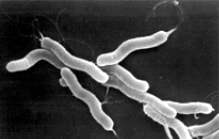|
Top page > Forefront of lactic acid bacteria research > OLL2716 lactic acid bacteria > What is Helicobacter pylori?
What is Helicobacter pylori?Helicobacter pylori
Cause of gastritis, stomach ulcer, and stomach cancerThe leading cause of death among Japanese is cancer. And of all types of cancer, stomach cancer is constantly ranked high on the list of most fatal diseases. Helicobacter pylori, which is known to cause gastritis, stomach ulcer, and stomach cancer, can spread in unhygienic environments without a proper sewerage system, or from mothers to their children by mouth-feeding, etc. If a person gets infected with Helicobacter pylori at a young age through one of these ways, the person must suffer the bacteria for the rest of their life. Once Helicobacter pylori enters the body, it will settle in the stomach where it damages the mucosa and causes inflammation. While not all cases of the diseases mentioned above are caused by Helicobacter pylori, research has shown that it is the culprit in 70 to 80% of all stomach ulcers, and 90 to 100% of all duodenal ulcers, as they occur due to gastric inflammation. Feature (1) History of Helicobacter pylori
Helicobacter pylori was first discovered in 1982, by Australian pathologist Dr. Robin Warren and gastroenterologist Dr. Barry Marshall. When Marshall, a physician specializing in the digestive organs, ingested Helicobacter pylori, he developed gastritis, which led him to identify the causal relation between the two. While roughly half of the world’s population is infected by this bacterium, the rate of infection is quite high in Southeast Asia and other regions that lack good sewerage systems. In the case of Japan, the rate of infection is high among people aged 60 years and above; younger people who tend to live in a more hygienic environment are less affected by Helicobacter pylori.
Feature (2) Origin of Helicobacter pylori
It was as recently as 2007 that it was discovered that we humans have been dealing with Helicobacter pylori for as long as we have walked the earth. When a joint Western research team collected Helicobacter pylori from a total of 769 individuals representing 51 different ethnic groups around the world and ran a gene analysis, and classified the specimens into six different groups by geographic region such as Africa, the Helicobacter pylori that parasitized East African natives was found to be the oldest strain. This finding indicates that when the first humans migrated from East Africa to various corners of the world 58,000 years ago, Helicobacter pylori hitched a ride and spread globally.
|
|||||||||||





